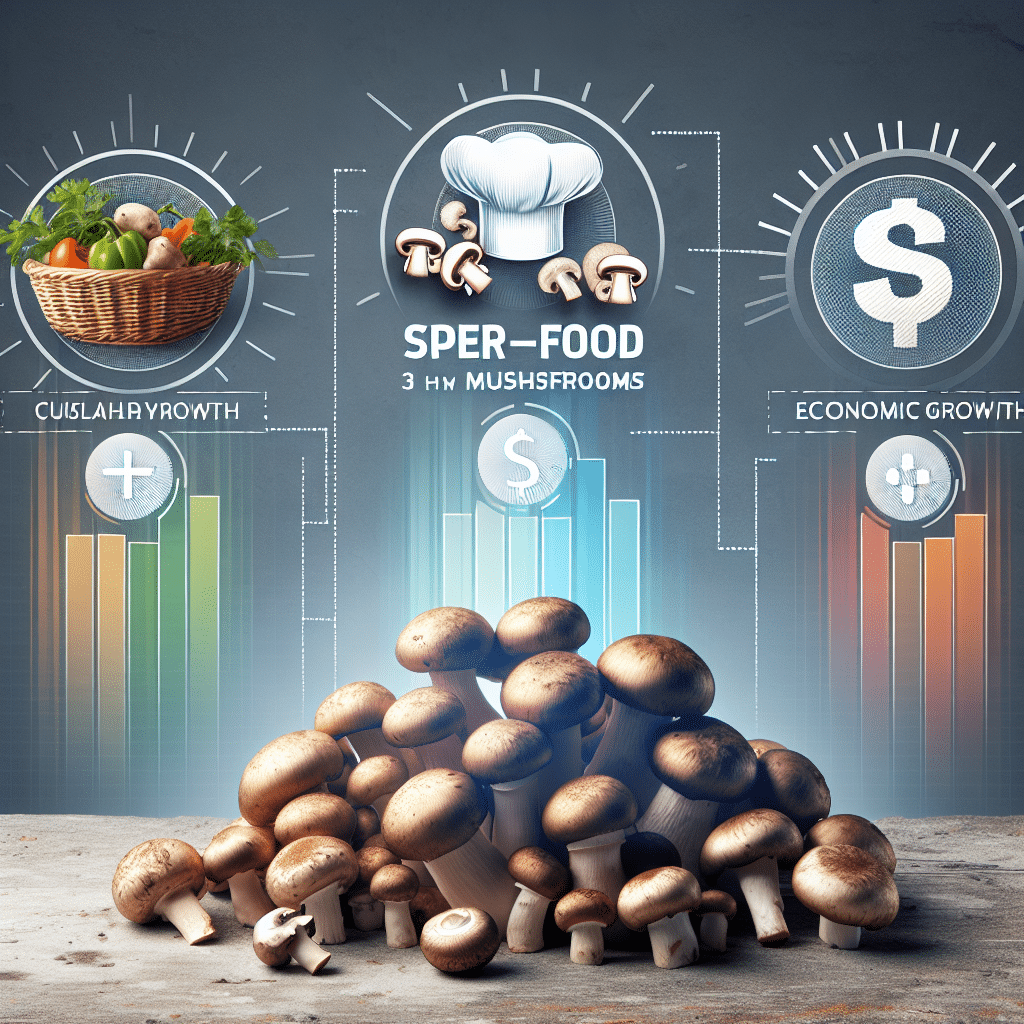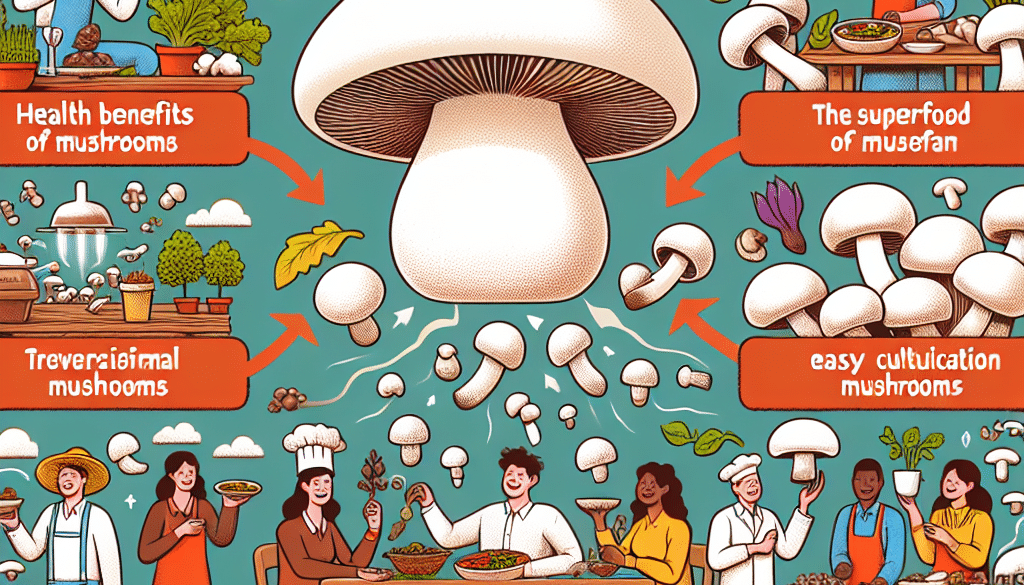New Superfood: 3 Reasons the Mushroom Market is Growing
-
Table of Contents
Mushroom Market Expansion: Top 3 Drivers of Its Growth

The mushroom market has been experiencing a significant surge in recent years, with a growing number of consumers and food industry professionals turning their attention to these versatile fungi. As the demand for healthier, more sustainable food options increases, mushrooms are emerging as a new superfood. This article delves into the three primary reasons behind the mushroom market’s growth, supported by compelling examples, case studies, and statistics.
1. Nutritional and Health Benefits
Mushrooms are packed with nutrients, making them an excellent addition to any diet. They are low in calories, high in fiber, and contain various vitamins and minerals, including B vitamins, selenium, potassium, and vitamin D. Moreover, mushrooms are one of the few non-animal sources of vitamin D, which is crucial for bone health and immune function.
- Medicinal Properties: Certain varieties of mushrooms, such as reishi, cordyceps, and lion’s mane, have been used in traditional medicine for centuries. Modern research is now validating their potential health benefits, including immune support, anti-inflammatory effects, and cognitive enhancement.
- Plant-Based Protein: With the rise of vegetarianism and veganism, mushrooms are becoming a popular protein alternative. They provide essential amino acids without the saturated fat and cholesterol found in animal proteins.
- Weight Management: The high fiber content in mushrooms can help with satiety and weight management, making them a favorable option for those looking to maintain or lose weight.
Case studies, such as those conducted by the Mushroom Council, have shown that incorporating mushrooms into meals can lead to better nutrition and health outcomes. For instance, a study published in the journal “Appetite” found that substituting mushrooms for meat in one meal a day resulted in a significant reduction in calorie and fat intake without compromising satiety.
2. Environmental Sustainability
Mushrooms are not only beneficial for our health but also for the planet. They have a relatively low environmental footprint compared to other crops, which is increasingly important to eco-conscious consumers and businesses.
- Low Resource Requirements: Mushrooms require less water, land, and energy to grow than traditional crops and animal agriculture. They can be cultivated on a variety of substrates, including agricultural byproducts, contributing to waste reduction.
- Carbon Footprint: The mushroom industry is known for its low carbon emissions. A study by the Mushroom Council revealed that the production of a pound of mushrooms generates only 0.7 pounds of CO2 equivalent, which is significantly lower than many other foods.
- Bioremediation: Some mushrooms are capable of bioremediation, a process where they break down or absorb harmful pollutants from the environment. This unique ability further enhances their appeal as a sustainable food source.
Statistics from the Food and Agriculture Organization of the United Nations (FAO) indicate that the global mushroom industry has been growing in response to the demand for more sustainable food production practices. The FAO reports that the production of mushrooms has nearly doubled in the past two decades.
3. Versatility and Culinary Innovation
The culinary world has embraced mushrooms for their versatility and unique umami flavor. Chefs and food manufacturers are continually finding innovative ways to incorporate mushrooms into various dishes and products.
- Meat Alternatives: Mushrooms’ meaty texture makes them an ideal substitute for meat in burgers, sausages, and other traditional meat-based foods. This has led to the development of mushroom-based meat alternatives that cater to vegetarians, vegans, and flexitarians alike.
- Functional Foods: The functional food market is booming, and mushrooms are at the forefront. Products like mushroom coffee, teas, and supplements are gaining popularity for their perceived health benefits and novel consumption experiences.
- Culinary Creativity: The variety of edible mushrooms, each with its own flavor profile and texture, inspires culinary creativity. From shiitake to portobello, the possibilities for creating delicious and nutritious dishes are endless.
Examples of mushroom market innovation include companies like Beyond Meat and Impossible Foods, which have developed plant-based meat products with mushrooms as a key ingredient. Additionally, the rise of gourmet mushroom farms has made exotic varieties more accessible to restaurants and consumers, further fueling culinary exploration.
Conclusion
The mushroom market is growing for good reason. The convergence of health and nutrition benefits, environmental sustainability, and culinary versatility makes mushrooms a superfood that is hard to ignore. As consumers become more health-conscious and environmentally aware, and as the culinary industry continues to innovate, the demand for mushrooms is expected to rise even further. This growth presents a significant opportunity for food producers, retailers, and innovators to capitalize on the mushroom trend.
Discover ETprotein’s Protein Products
For those interested in incorporating high-quality protein into their diets, ETprotein offers a range of organic bulk vegan proteins that are perfect for health-conscious consumers. Their products, including pea protein, rice protein, and various seed proteins, are non-GMO, allergen-free, and feature a neutral taste. ETprotein’s L-(+)-Ergothioneine (EGT) supplements are also available for those seeking additional health benefits. Whether you’re a distributor, trader, or manufacturer, ETprotein can meet your protein needs with their extensive product range.
About ETprotein:
ETprotein, a reputable protein and L-(+)-Ergothioneine (EGT) Chinese factory manufacturer and supplier, is renowned for producing, stocking, exporting, and delivering the highest quality organic bulk vegan proteins and L-(+)-Ergothioneine. They include Organic rice protein, clear rice protein, pea protein, clear pea protein, watermelon seed protein, pumpkin seed protein, sunflower seed protein, mung bean protein, peanut protein, and L-(+)-Ergothioneine EGT Pharmaceutical grade, L-(+)-Ergothioneine EGT food grade, L-(+)-Ergothioneine EGT cosmetic grade, L-(+)-Ergothioneine EGT reference grade and L-(+)-Ergothioneine EGT standard. Their offerings, characterized by a neutral taste, non-GMO, allergen-free attributes, with L-(+)-Ergothioneine purity over 98%, 99%, cater to a diverse range of industries. They serve nutraceutical, pharmaceutical, cosmeceutical, veterinary, as well as food and beverage finished product distributors, traders, and manufacturers across Europe, USA, Canada, Australia, Thailand, Japan, Korea, Brazil, and Chile, among others.
ETprotein specialization includes exporting and delivering tailor-made protein powder and finished nutritional supplements. Their extensive product range covers sectors like Food and Beverage, Sports Nutrition, Weight Management, Dietary Supplements, Health and Wellness Products, and Infant Formula, ensuring comprehensive solutions to meet all your protein needs.
As a trusted company by leading global food and beverage brands and Fortune 500 companies, ETprotein reinforces China’s reputation in the global arena. For more information or to sample their products, please contact them and email sales(at)ETprotein.com today.












